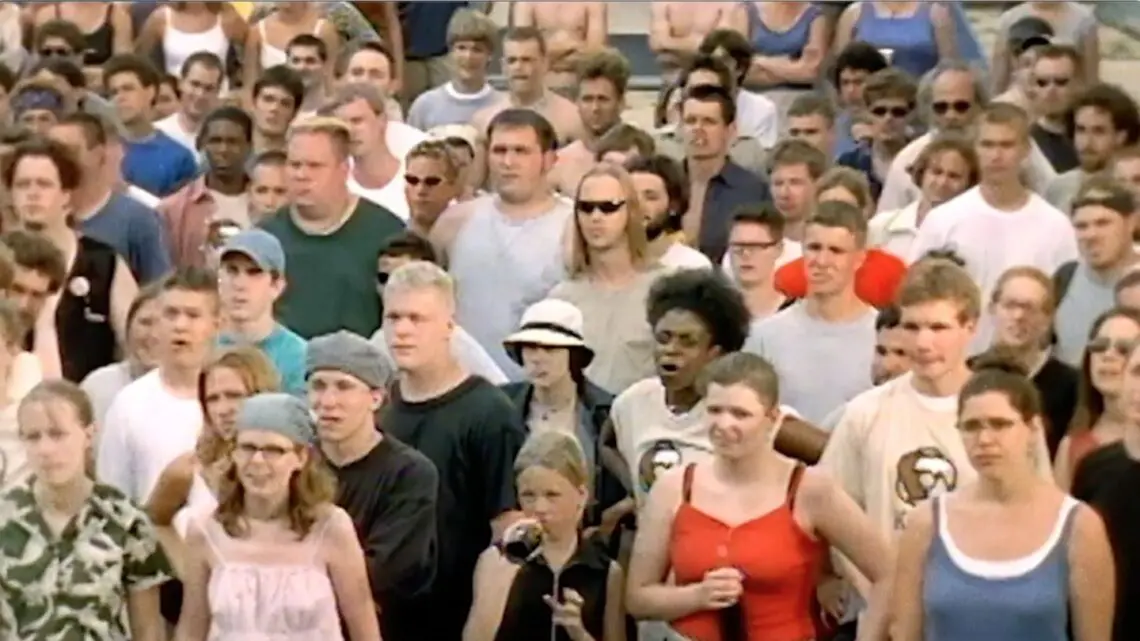Mockumentary Taste the Revolution from writer and director Daniel Klein, starring Mahershala Ali in his first lead role, finally premiered with a 25-year delay at the New Orleans Film Festival in October. Now, it is screening at the fourth edition of the Red Sea International Film Festival (RSIFF). And Klein was on hand for a brief Q&A after the movie’s first screening at the fest in Jeddah, Saudi Arabia, sharing some insight into the long journey of the project that also sees Colin Trevorrow (Jurassic World franchise) appearing in several small roles and serving as an executive producer. Ali plays a revolutionary leader called Mac Laslow who heads up a summit of young adults looking to change the world and blow off some steam. The story is told through the lens of two filmmakers documenting the summit with their cameras. Taste the Revolution, Klein’s feature directorial debut, wrapped filming in 2001 but was shelved following the events of 9/11, with Klein and collaborators later reviewing the footage during the COVID pandemic and editing it into a movie. Phil Cohen, Maury Loeb, David Linke, and Kevin Linke produced the project, while the executive producers are Ali, Klein, Trevorrow, and Cohen. Among the cast are Alexander Bilu, Jeremy Dubin, Jen Nails, Jeremy Beiler, and Ali’s now-wife Amatus Sami-Karim. “Mahershala and I were both at school. He was a graduate and about to graduate from the acting school, and I was an undergrad in film,” Klein told the RSIFF audience. “We met at a coffee shop and just started to talk about music and basketball, and it just kind of blossomed into everything else.” Klein mentioned the project, telling Ali: “I got this movie I’m going to be making with no money,” he recalled. “I would really love for you to come and join us.” But Klein had a different part in mind for Ali, that of Malik Browne, which ended up being played by Kevin Bozeman. “(Ali) came to me and said: ‘I shouldn’t be this. Why wouldn’t I be the leader of this group?’ And I said: ‘Oh, it’s a comedy. That guy’s supposed to be super vapid. That’s not you at all.’ And he said, ‘Please let me come in to read for it.’ And he came in to read for the part. And you see it on the screen, he was just transcendent. He was so amazing. And the opportunity to get to work with him.” While Klein was trying to make a comedy at the time, sharing that “I didn’t know what I was doing.” Once Ali came on board, “he was so good, and then it was not quite a comedy anymore,” Klein recalled. “It then became something different, and I would argue a whole lot better and more resonant.” But then the terrorist attack happened. “We were in post, and 9/11 occurred, and suddenly the movie made no sense at all,” Klein told his audience in Saudi Arabia. “It just felt like a weird, out-of-time period piece. I had no idea what to do. I was a young filmmaker. I had no clue what to do with this, so we cobbled together a regrettable cut for cast and crew, and it was unbelievably embarrassing. I mean, it was a humiliating night sharing this movie. I thought let me honor the people. They put in their time and effort because we gave them no money. I showed them that movie. It was literally one of the two worst nights of my life, and then we buried the movie.” He saw it as in the past and as a learning experience. “And then (Ali) won his Oscar, and then he won his second Oscar. So I sent him a clip of the movie,” Klein recalled. “It’s him delivering a speech. It’s three minutes and 45 seconds. He’s amazing. And he called up and said, ‘We got to finish this movie’.” When the COVID pandemic hit, people couldn’t shoot new projects, so the team had time to sift through the film footage. “We turned around and feasted on the footage,” Klein explained. “We really have 130 hours. It’s a shocking amount of footage. So we poured over everything and anything.” Once he had finished his new edit, he screened the updated version for Ali, Sami-Karim, and others in California. Despite initial concerns that it may feel dated, “someone stood up and said: ‘I fear, sadly, this movie will always be relevant because it’s about a chapter of life that people go through. And it’s not necessarily about when it was shot,” Klein shared. Asked about Trevorrow’s involvement, he said: “He’s in the movie. He plays a guy who kind of introduces all the different groups around the camp, and then he’s a guy who’s ingesting drugs, and then this guy who’s in the tree, and oh, he’s (an) overdose victim. And he was there at the very beginning.” Klein chuckled as he also recalled Trevorrow’s feedback. “He read the first draft of the script, and he wrote me this super long email, back when emails were relatively new, and it was really long,” he explained. “It was like a book, and he said: ‘Here’s how to not screw up your movie.’ We met in film school and were delighted with each other’s work, and he actually came to the shoot. And there’d be times when he would just grab a camera and help to direct background B roll. It was incredibly valuable and amazingly important on many levels.” Did Ali put money into the final movie, an audience member asked. “No, there’s no money put into it,” Klein replied. “It was more his blessing. For lack of a better description, it was very affirming for us. We just felt if he’s excited about it. That’s currency enough.”

 English
English




